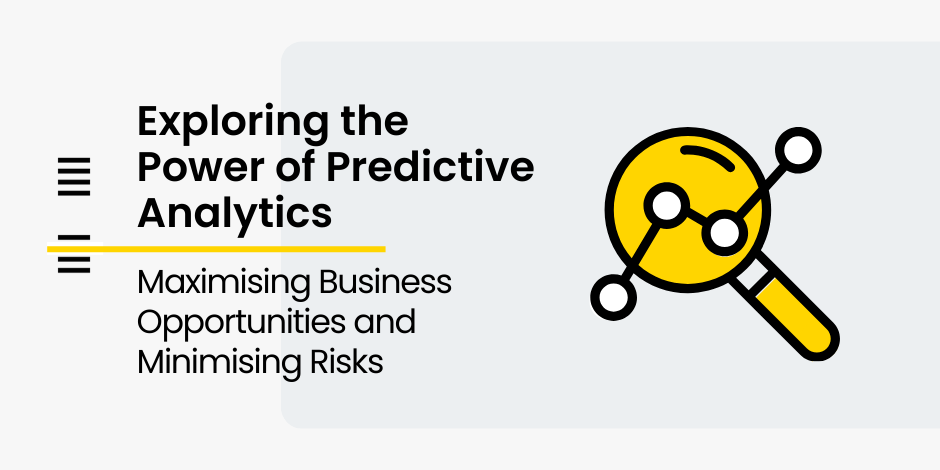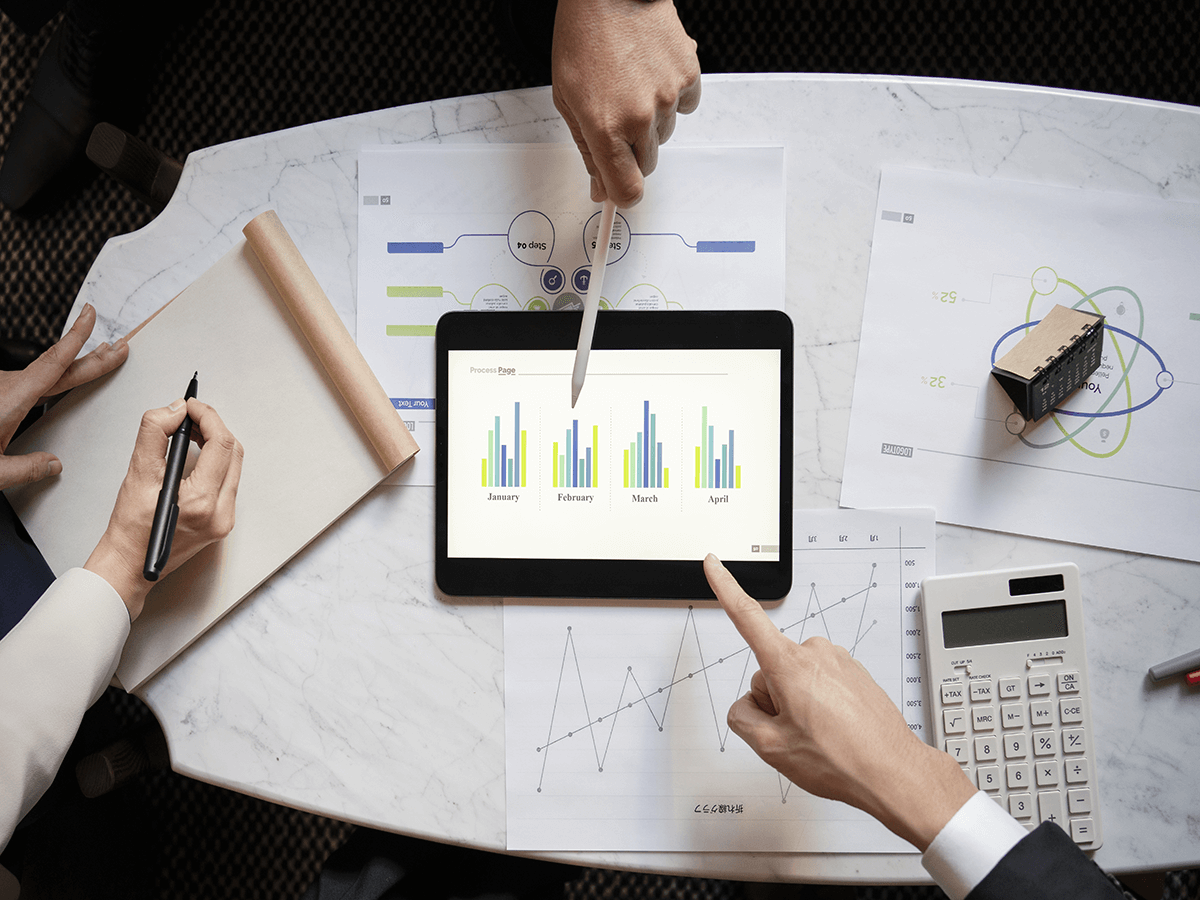Exploring the Power of Predictive Analytics: Maximising Business Opportunities and Minimising Risks

Stay Informed With Our Weekly Newsletter
Receive crucial updates on the ever-evolving landscape of technology and innovation.
The power of predictive analytics has revolutionised the way businesses operate in today’s data-driven world.
By leveraging advanced algorithms and statistical models, organisations can now make informed decisions based on future trends and patterns.
This article explores the concept of predictive analytics, its role in business, and how it can be used to maximise opportunities and minimise risks.
Understanding the power of predictive analytics

The power of predictive analytics involves the use of historical data, statistical algorithms, and machine-learning techniques to identify future outcomes and trends. It helps businesses gain insights into customer behaviour, market trends, and operational performance.
By analysing patterns and correlations in data, companies can make accurate predictions and take proactive measures to optimise processes and improve decision-making.
The predictive analytics market is poised for substantial expansion, with estimates suggesting a remarkable growth from $14.71 billion in 2023 to an anticipated $67.66 billion by 2030, reflecting a robust compound annual growth rate (CAGR) of 24.4%.
Let’s delve deeper into the power of predictive analytics and explore how it works, and its significance in various industries.
The science behind predictive analytics
The science behind predictive analytics lies in statistical modelling and machine learning algorithms. These algorithms examine historical data, apply mathematical calculations, and identify patterns and trends.
Statistical modelling involves the use of mathematical equations to represent relationships between variables. These equations are derived from historical data and are used to predict future outcomes based on the patterns observed.
Machine learning algorithms, on the other hand, use computational models to learn from data and make predictions without being explicitly programmed. Algorithms can be classified into different types, such as regression analysis, decision trees, neural networks, and clustering.
Each algorithm has its own strengths and weaknesses, and the choice of algorithm depends on the nature of the problem and the available data.
The role of predictive analytics in business
The power of predictive analytics plays a crucial role in various aspects of business, from operations to marketing and finance. It enables organisations to make proactive decisions, optimise processes, and improve customer satisfaction.
In operations, predictive analytics can be used to forecast demand, optimise inventory levels, and improve supply chain management.
Accurately predicting customer demand enables companies to ensure that they have the right amount of inventory at the right time, minimising stockouts and reducing carrying costs.
Additionally, the power of predictive analytics can help identify bottlenecks in the supply chain and suggest ways to optimise logistics and distribution.
In marketing, predictive analytics can help businesses understand customer behaviour and preferences, enabling them to target their marketing efforts more effectively.
Analysing past purchase history, browsing patterns, and demographic information, lets companies identify customer segments and develop personalised marketing campaigns.
This not only improves customer engagement but also increases the chances of conversion and customer retention.
In finance, the power of predictive analytics can be used for credit scoring, fraud detection, and risk management. This helps in making informed decisions about lending and reduces the risk of default.
Predictive analytics can also be used to detect fraudulent activities by identifying patterns and anomalies in transaction data.
The power of predictive analytics in decision making

One of the key advantages of predictive analytics is its ability to enhance decision-making processes. This helps in optimising resource allocation, improving operational efficiency, and mitigating risks.
Enhancing business operations with predictive analytics
Predictive analytics can provide valuable insights into operational processes.
Through strategic data analysis related to production, supply chain, and customer demand, businesses can identify bottlenecks, optimise workflows, and improve efficiency. For example, the power of predictive analytics can help in predicting equipment failures, enabling preventive maintenance and minimising downtime.
Predictive analytics: A tool for strategic planning
The power of predictive analytics also plays a vital role in strategic planning. This helps in devising effective strategies that align with future trends, enhancing business growth, and staying competitive in the market.
Maximising business opportunities with predictive analytics
Businesses can use the power of predictive analytics to identify potential markets and tap into new opportunities.
With insights into consumer behaviour and market trends, companies can uncover hidden patterns and make accurate predictions about consumer preferences and buying habits.
Identifying potential markets through predictive analytics
Predictive analytics enables businesses to identify potential markets that align with their products or services.
Businesses that analyse demographic data, purchasing behaviours, and social media trends, can identify target markets that offer growth opportunities.
This helps in creating targeted marketing campaigns and capturing untapped market segments.
Predictive analytics and revenue growth
When a business analyses historical sales data, market trends, and customer preferences, it can identify optimal pricing points and implement dynamic pricing strategies. This helps in maximising profitability and gaining a competitive edge in the market.
Minimising business risks through predictive analytics
The power of predictive analytics can help businesses identify and mitigate potential risks, ensuring a robust risk management strategy.
Predictive analytics for risk assessment
By analysing historical data and patterns, businesses can identify risks and take necessary precautions to mitigate them.
For example, predictive analytics can be used in insurance to assess customer risk profiles and accurately price policies. This helps in minimising financial exposure and improving profitability.
Mitigating financial risks with predictive analytics
Predictive analytics can also help businesses in identifying potential financial risks and taking proactive measures to mitigate them.
Companies that analyse financial data, market trends, and economic indicators, can identify potential cash flow issues, credit risks, or market downturns. This helps in implementing risk mitigation strategies and ensuring financial stability.
The future of predictive analytics in business

The field of predictive analytics is continuously evolving, driven by advancements in technology and data science.
As we move towards an era of artificial intelligence and machine learning, the potential applications of predictive analytics are only going to expand.
Emerging trends in predictive analytics
One of the emerging trends in predictive analytics is the incorporation of unstructured data sources, such as social media and text data, into the analysis.
This provides businesses with a deeper understanding of customer sentiments, preferences, and behaviour patterns.
Additionally, predictive analytics is also being integrated into various business intelligence tools, making it more accessible to non-technical users.
The impact of artificial intelligence on predictive analytics
Artificial intelligence (AI) is expected to revolutionise the field of predictive analytics. AI-powered algorithms are capable of processing vast amounts of data, identifying intricate patterns, and making accurate predictions.
This opens up new possibilities for businesses, enabling them to gain deeper insights and make more precise predictions.
In conclusion
The power of predictive analytics stands as an invaluable asset for businesses, offering the potential to not only seize opportunities but also mitigate risks effectively.
As organisations dive further into the intricacies of predictive analytics and embrace its capabilities, they have the potential to develop a competitive edge in the ever-evolving landscape of data and tech.
Are you ready to unlock the potential of predictive analytics? Explore our tailored programs at the Institute of Data for full-time and part-time students.
Should you have questions or seek personalised guidance on how to harness the power of predictive analytics, we invite you to schedule a complimentary career consultation with a member of our expert team to discuss our program options.
Your future in data-driven decision-making awaits!




